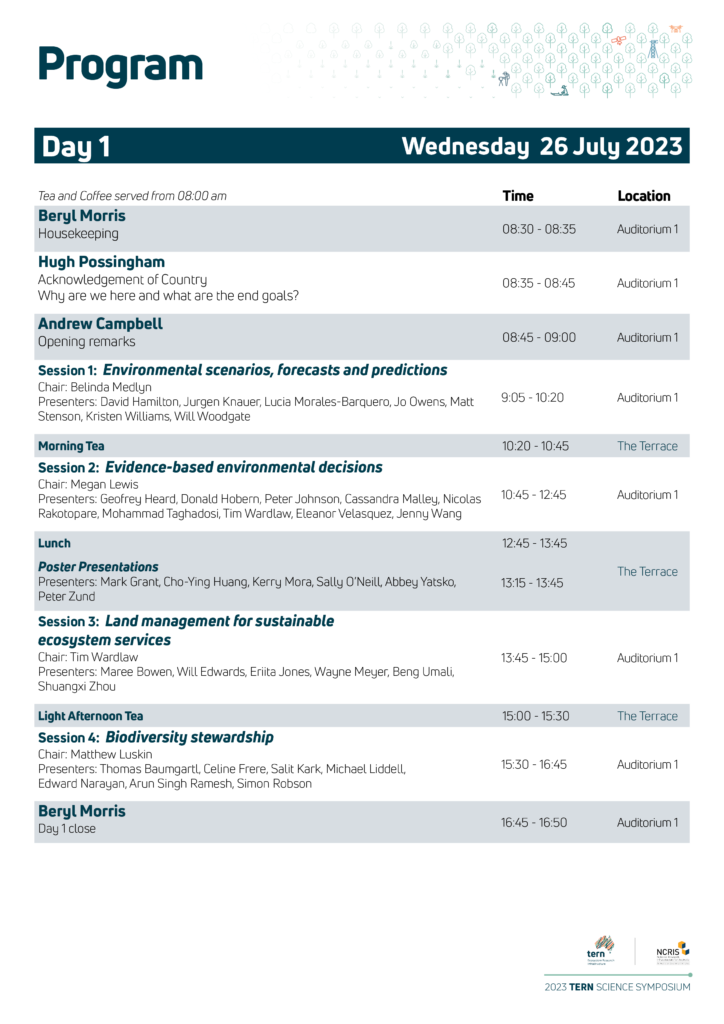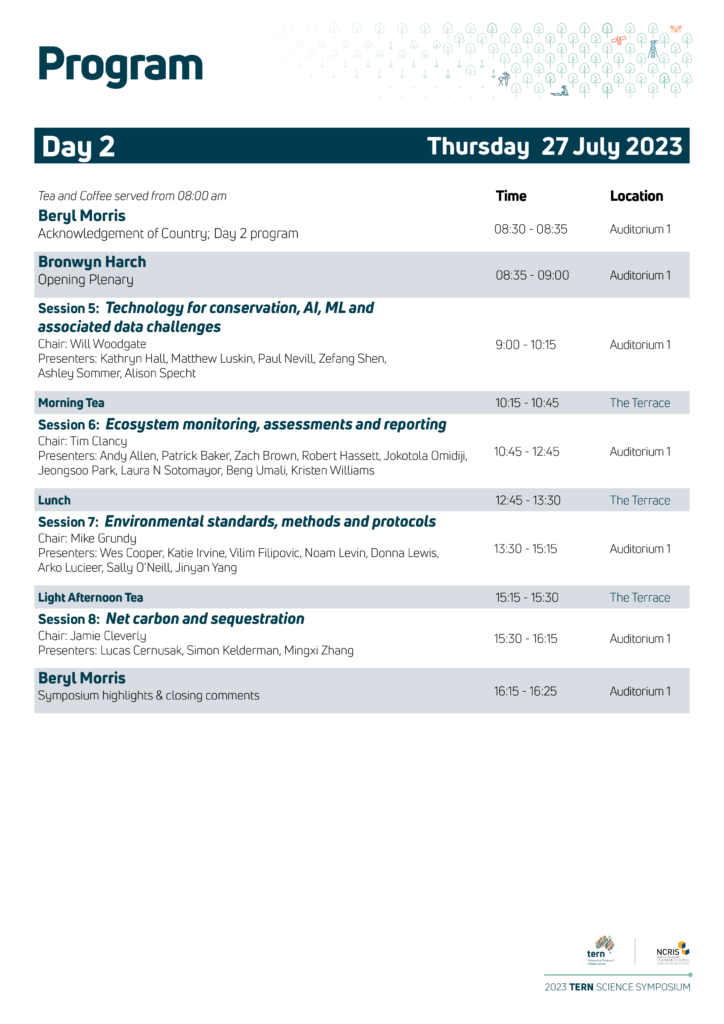The TERN Science Symposium 2023 is a forum for sharing ecosystem science research, technological development, data system innovation, collaboration and action.
The TERN 2023 Science Symposium is open to all ecosystem researchers and we are particularly pleased to welcome participation from members of the International Long Term Ecological Research (ILTER) network’s East Asia Pacific regional network.
TERN Australia was proud to host its 2023 Science Symposium in the city of Brisbane, facilitating both in-person and online participation.
On this page:
Symposium themes
In 2023 we are exploring how your research or planned research help to address a range of current societal challenges, including the following:
- Land management for sustainable ecosystem services
- Evidence-based environmental decisions
- Net carbon and sequestration
- Biodiversity stewardship
- Technology for conservation, AI, ML and associated data challenges
- Environmental scenarios, forecasts and predictions
- Ecosystem monitoring, assessments and reporting
- Environmental standards, methods and protocols
Presentations that highlight the contribution of Indigenous knowledge would be particularly welcome.
TERN Science Symposium in 2021 presentation recordings are available here.
Presentation Recordings
All the sessions were recorded and compiled below. Hover on the loading bar to see all the chapters within each session.
Day 1 Opening Session & Session 1: Environmental scenarios, forecasts and predictions
Day 1 Opening Session
- Beryl Morris – Opening welcome and housekeeping
- Hugh Possingham -Acknowledgement of Country & Why are we here and what are the end goals?
- Andrew Campbell – Opening remarks
Session 1
Chair: Belinda Medlyn
Presenters: David Hamilton, Jurgen Knauer, Lucia Morales-Barquero, Jo Owens, Matt Stenson, Kristen Williams, Will Woodgate
Session 2: Evidence based environmental decisions
Chair: Megan Lewis
Presenters: Geofrey Heard, Donald Hobern, Peter Johnson, Cassandra Malley, Nicolas Rakotopare, Mohammad Taghadosi, Tim Wardlaw, Eleanor Velasquez, Jenny Wang
Session 3: Land management for sustainable ecosystem services
Chair: Tim Wardlaw
Presenters: Maree Bowen, Will Edwards, Eriita Jones, Wayne Meyer, Beng Umali, Shuangxi Zhou
Session 4: Biodiversity stewardship
Chair: Matthew Luskin
Presenters: Thomas Baumgartl, Celine Frere, Salit Kark, Michael Liddell, Edward Narayan, Arun Singh Ramesh, Simon Robson
Day 2 Opening Session & Session 5: Tech for conservation, AI, ML & associated data challenges
Day 2 Opening Session
- Beryl Morris – Acknowledgement of Country & Day 2 program
- Bronwyn Harch – Opening Plenary
Session 5
Chair: Will Woodgate
Presenters: Kathryn Hall, Matthew Luskin, Paul Nevill, Zefang Shen, Ashley Sommer
Session 6: Ecosystem monitoring, assessments and reporting
Chair: Tim Clancy
Presenters: Andy Allen, Patrick Baker, Zach Brown, Robert Hassett, Jokotola Omidiji, Jeongsoo Park, Laura N Sotomayor, Beng Umali, Kristen Williams
Session 7: Environmental standards, methods and protocols
Chair: Mike Grundy
Presenters: Wes Cooper, Katie Irvine, Vilim Filipovic, Noam Levin, Donna Lewis, Arko Lucieer, Sally O’Neill, Alison Specht, Jinyan Yang
Session 8: Net carbon and sequestration & closing of the Symposium
Chair: Jamie Cleverly
Presenters: Lucas Cernusak, Simon Kelderman, Mingxi Zhang
Symposium aims
Science symposiums provide an important opportunity for researchers from around the world to come together and share their latest findings. As a critical component of the scientific process, science symposiums allow different experts to exchange ideas and discuss pertinent research questions.
TERN hopes to achieve the following from the 2023 Science Symposium:
- Showcasing the excellent research using national research infrastructure, data streams, samples and data products
- Build awareness of the products and services offered by TERN
- Encourage participation by students and early career researchers
- Facilitating connections between researchers and the people who will make myriad decisions based on the data obtained from TERN’s long term monitoring
- New relationships between researchers in cross disciplinary areas
- Stimulating follow-up discussion
- Demonstrating the value of ongoing investment in national research infrastructure and monitoring programs
The Symposium is free, open and available for everyone. We invite you to join us.
“World‑class climate and environmental science is required to inform successful adaptation approaches that will help protect communities, infrastructure, industries, environments and biodiversity”
Speakers & session chairs
The Chair of the TERN Advisory Board, Professor Hugh Possingham, and the Patron of the Biennial Science Symposium, Professor Andrew Campbell will provide opening remarks and we are pleased to confirm the following session chairs.
Speakers
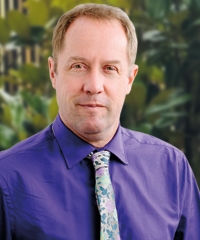
Prof. Hugh Possingham
The University of Queensland
Opening remarks
Hugh is currently Chief Councillor of the newly created Biodiversity Council and Chief Scientist of Accounting for Nature. He is also the Chair of the TERN Advisory Board.
He has recently been Queensland Chief Scientist and Chief Scientist of The Nature Conservancy, the world’s largest environmental non-government organisation.
He retains a 20 percent appointment at The University of Queensland and was an ARC Laureate Fellow until the end of 2018. His research interests are in conservation research, operations research and ecology.
More specifically, his research interests include securing the world’s biological diversity: efficient nature reserve design, habitat reconstruction, monitoring, optimal management of populations for conservation, cost-effective conservation actions for threatened species, pest control and population harvesting, survey methods for detecting bird decline, bird conservation ecology, environmental accounting and metapopulation dynamics.
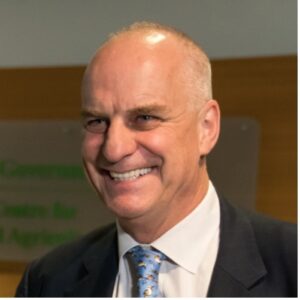
Prof. Andrew Campbell
Australian Centre for International Agricultural Research
Opening remarks
Professor Andrew Campbell was the Inaugural Chair of the TERN Advisory Board from November 2009 to December 2016. He is currently Chief Executive Officer of the Australian Centre for International Agricultural Research (ACIAR), appointed by the Foreign Minister in 2016.
Among influential roles in sustainable agriculture and research management in Australia for over thirty years, Andrew Campbell was Australia’s first National Landcare Facilitator, and CEO of Land & Water Australia for seven years from 2000. He is Patron of Landcare in Victoria, succeeding the late Joan Kirner in 2015.
Professor Campbell is an elected Fellow of the Australian Academy for Technology and Engineering, a Professorial Fellow at the ANU Fenner School, and a Fellow of the Australian Institute for Company Directors. He represents Australia on the System Council of the CGIAR, and has also been a past Chair of the Global Research Alliance on Agricultural Greenhouse Gases (GRA).
Andrew Campbell has written widely on landcare, sustainability and the science-policy interface. Andrew Campbell is still involved in landcare work on his farm in south-eastern Australia, where his family has been farming since the 1860s.
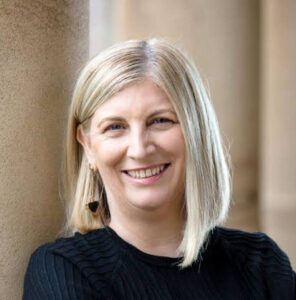
Prof. Bronwyn Harch
Queensland University of Technology
Opening plenary
Professor Bronwyn Harch is a leader in research and innovation strategy with a passion for brokering transdisciplinary collaboration through private-public alliances.
With a statistics and data science background, Professor Harch has significant research and innovation leadership experience, having been in senior executive roles in Queensland Government, UQ, QUT and CSIRO. She was named in the top 60 Australian Statisticians as part of the 60th birthday celebrations of the Statistical Society of Australia in 2023. Professor Harch is the incoming Griffith University Vice President Industry and External Engagement (from October 2023).
She holds a Bachelor’s Degree in Science (with Honours) in Australian Environmental Studies, a Graduate Diploma in Secondary Teaching, plus a PhD in biometrics.
Professor Harch is passionate about science and innovation endeavours that make our communities more secure, resilient and sustainable.
Professor Harch currently serves on several Australian and international boards and advisory committees relating to research and innovation, including the Federal Government Co-operative Research Centre Advisory Committee, AgResearch New Zealand, Future Drought Fund Resilience Hubs Advisory Committee, Australian Pork Limited, and is an elected a Fellow of the Australian Academy of Technological Sciences and Engineering (ATSE).
Session Chairs
Day 1
Distinguished Professor Belinda Medlyn
University of Western Sydney
Session 1 – Environmental scenarios, forecasts and predictions
Emerita Professor Megan Lewis
The University of Adelaide
Session 2 – Evidence-based environmental decisions
Dr Tim Wardlaw
University of Tasmania
Session 3 – Land management for sustainable ecosystem services
Dr Matthew Luskin
The University of Queensland
Session 4 – Biodiversity stewardship
Day 2
Dr Will Woodgate
The University of Queensland
Session 5 – Technology for conservation, AI, ML and associated data challenges
Dr Tim Clancy
Northern Territory Government
Session 6 – Ecosystem monitoring, assessments and reporting
Mr Mike Grundy
Independent
Session 7 – Environmental standards, methods and protocols
Dr Jamie Cleverly
James Cook University
Session 8 – Net carbon and sequestration
Program & Abstracts Book
